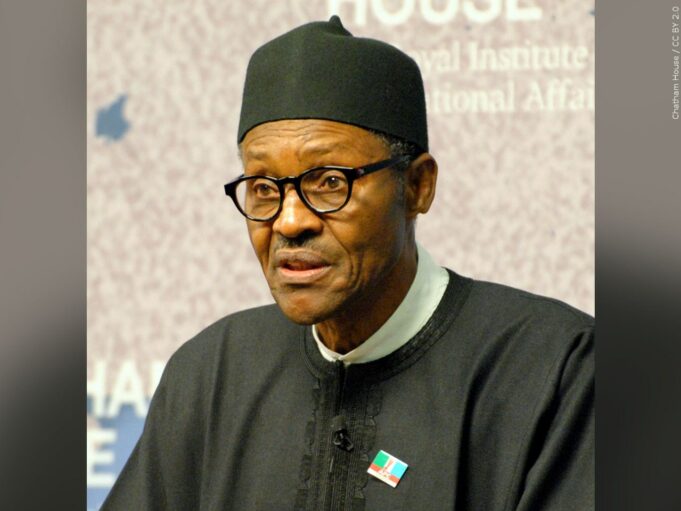Last month Nigerian President Muhammadu Buhari, in Abuja, called on member states of the Economic Community of West African States (ECOWAS) to remove what he described as “outdated physical and psychological boundaries and other colonially-inspired differences” for the region to progress economically. Buhari, who because of the two-term limit cannot run again for a third-term in the upcoming February 25, 2023 presidential election.

According to Nigeria’s Vanguard publication, during the opening of the 2022 Second Ordinary Session of the ECOWAS Parliament, Buhari said, “The vision of the founding fathers of ECOWAS was to have a West Africa that is integrated economically with harmonized policies, enjoying free movement of persons, goods and services, as well as seamless right to establishment.”
ECOWAS has its root in the 1960s with West African States attempting a unified economic community. It was created from the result of the “Treaty of Lagos, Nigeria, on May 28, 1975, and was spearheaded by Yakuba Gowan of Nigeria and Gnassigbe Eyadema of Togo, noted thoughtco.com. ECOWAS’ primary objective is the promotion of economic trade, national cooperation, and monetary union, for growth and development throughout the region.
Its 15 member countries include Benin, Côte d’Ivoire (Ivory Coast), Gambia, Ghana, Guinea, Guinea-Bissau, Liberia, Mali, Mauritania (left 2002), Niger, Nigeria, Senegal, Sierra Leone, Togo, and Burkina Faso (which joined as Upper Volta).
ECOWAS’ developments include breaking the ground of new headquarters. It will be built by China, the group confirmed in a March 14, 2018, press statement.
Chinese Ambassador to Nigeria, Cui Jianchun recently provided an update on the development of the project while taking the management of ECOWAS’ commission and representatives of the Nigerian government on tour of the proposed site in Abuja. Ambassador Cui said the Chinese government would fully fund the projected $31.6 million proposed cost of the construction of the new headquarters. China also built the African Union headquarters located in Ethiopia’s capital city Addis Ababa.
One of ECOWAS’ biggest impediments is the launching of West Africa’s single currency. In fact, ECOWAS has postponed launching, reported German media outlet DW, on four different occasions: 2015, twice in 2014 and in 2020.

And the fact that there has not been much cooperation between English and French-speaking countries in West Africa, in terms of working together on investment issues and regional trade, is a case in point.
Jerry J. Afo Larbi, an economist and financial analyst has said that the Eco currency to be successfully launched, there must be unanimous agreement between anglophone and francophone countries in the region. “There’s a need to promote the currency and educate the indigenes of individual countries for it to work,” he said during a press briefing.
“Francophone countries within the ECOWAS region, particularly those that use the CFA franc, have their own perceptions of how the Eco currency would work. The CFA franc is used in 14 African countries, split into the West African CFA and the Central African CFA, and used by about 150 million,” noted DW.
This influence also includes the creation and ongoing “French control of the currencies of its Central and West African former colonies,” according to economist Dr. Ndongo Sylla, co-author of “Africa’s Last Colonial Currency: The CFA Franc Story.”
In fact, it was the Charles De Gaulle administration that crafted the CFA franc monetary system. CFA is the French acronym for “French colonies of Africa.” This neocolonial arrangement gave the 14 newly independent French African colonies a stable and robust currency, but it also legally obligated them to put 50 percent of their foreign currency reserves into the French Treasury.
In the early part of 2022, in an article titled, “France’s Troubles in West Africa Go Well Beyond a Failed Counter-Insurgency,” writer Howard French claims, “France’s crisis, and the crisis of all of its client states in Africa, is nothing less than a crisis of stalled decolonization.” He explains it as a case of wanting to let go, but not wanting to leave the region.
French leaves open a door that Senegalese economist Dr. Sylla closes. France historically has done everything in its power to maintain its CFA cash-cow, anything less is peripheral or wishful thinking, and frankly removes it from its global power status. France measures its survival on what undergirds its economy, not on “crises of stalled decolonization” or “paralyzing ambivalence,” he notes.
Concerning ECOWAS fulfilling its mandate, which includes an integrated economy, Sylla argues, there has been little change when it comes to French control of the currencies of its Central and West African former colonies. “I think this colonial relationship still continues,” said Sylla, a development economist and go to economist on West Africa.
Pigeaud and Sylla believe more broadly for France, that “the political costs may be outweighing the economic gains,” according to Carlos Lopes, High Representative of the Commission of the African Union. But it is still noticeable how French diplomats are trying to upend decades of agreements within ECOWAS as they seek to provide technical assistance to this monetary transition.
To draw upon economist Tchundjang Pouemi’s concluding words from his 1980 book, “Africa’s fate will be forged through money or it won’t be forged at all.”
Follow @JehronMuhammad on Twitter













